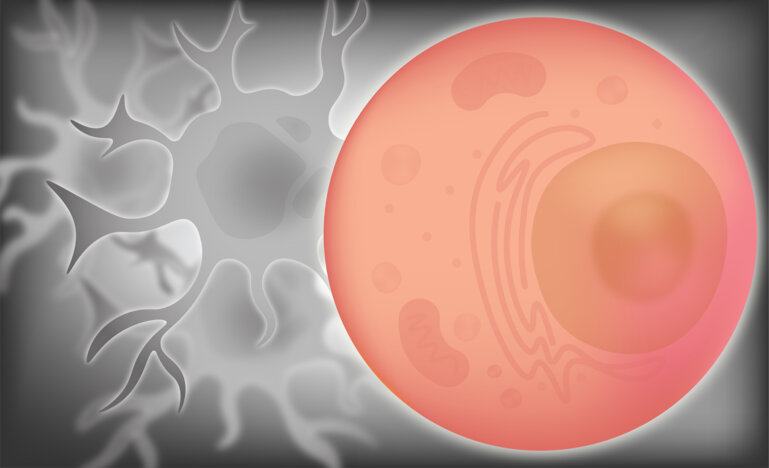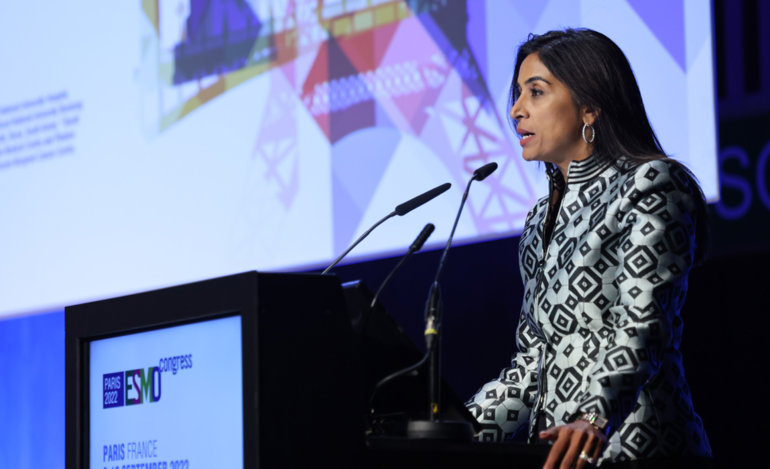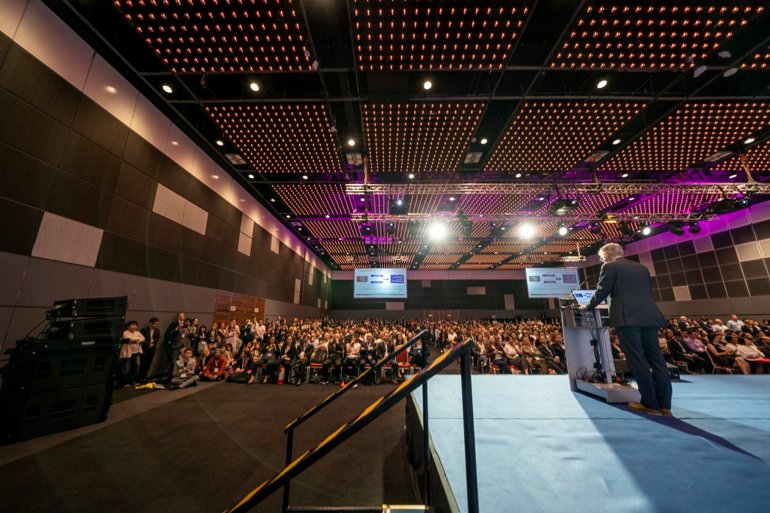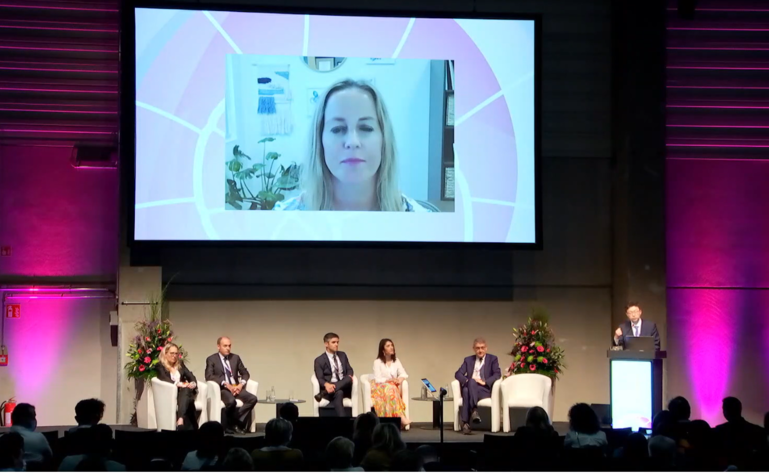Despite early promises, advances are needed in targeting tumour-specific epitopes, overcoming the tumour microenvironment, and automating CAR-T production, explains Prof. Ulrike Köhl
Chimeric antigen receptor T cell (CAR-T) cell therapy is a type of ‘living medicine’ in which a patient’s T cells are collected and then modified ex vivo. They are redirected against a cancer epitope in order to destroy cancer cells when they are reinfused. The basic principles are the same for solid tumours and blood cancers but targeting solid tumours is much more complex than targeting single cancer cells in the blood or bone marrow. On the occasion of the ESMO Virtual advanced course on CAR-T and next generation cell therapies in haematology and solid tumours 2021 (25-26 June) Prof. Ulrike Köhl, Fraunhofer Institute for Cellular Therapeutics and Immunology and University of Leipzig, Germany, provides an overview on current challenges and future promises.
Why does CAR-T cell therapy for solid tumours lag behind that for blood cancers?
Spectacular remissions have been achieved in haematology in patients with refractory CD19 positive leukemia and lymphoma, but CAR-T cell therapy is not effective in all blood cancers. So far, it is not effective in solid tumours, and there are two main challenges. The first is that many of the epitopes on cancer cells that we want to target with CAR-T therapy are also expressed on healthy cells, such as heart and kidney cells, so there is potential for serious toxicity due to on-target, off-tumour activity.
The tumour microenvironment of support cells and blood vessels that aid cancer progression is another major challenge for CAR-T therapy in solid tumours. The same mechanisms that contribute to cancer progression and prevent immune cells from destroying tumours also prevent CAR-T cells from attacking them.
How are these challenges being addressed?
In solid tumours, we and others are starting to focus on CAR-T cell therapy in combination with other treatments, such as checkpoint inhibitors, in order to overcome the tumour microenvironment. For example, in lung adenocarcinoma, adding oxaliplatin to CAR-T cells targeting the tumour-associated tyrosine kinase-like orphan receptor 1 (ROR1) was shown to activate tumour macrophages to express T cell recruiting chemokines, as nicely demonstrated by Stanley Riddell´s group (Cancer Cell 2021 Feb 8;39(2):193-208). This in turn led to improved CAR -T cell infiltration, remodelling of the tumour microenvironment and increased tumour sensitivity to anti-PD-L1 checkpoint inhibitor therapy. The research very nicely showed the effects of a cascade of different immune cells acting synergistically to potentially improve CAR-T cell efficacy.
This combination approach seems to be the way to go in solid tumours – to recruit other immune cells such as macrophages, natural killer (NK) cells and dendritic cells to also enter the tumour microenvironment.
To combat the issue of epitope-associated toxicity, research is investigating the use of dual CARs which have domains to bind to two tumour epitopes and thus reduce the risk of targeting healthy cells, but there are still difficulties if there is variation in epitope expression. Another option is to link the patient’s own T or NK cells to bi- or even tri-specific antibodies which will anchor them directly to tumour cells.
What is the early evidence of efficacy of CAR-T in solid tumours and in which cancers they show the most promise?
It is far too early to talk about efficacy, we do not yet have enough data, though there have been some encouraging results of CAR-T cell therapy targeting prostate specific membrane antigen (PSMA) in prostate cancer (J Clin Oncol 2021; 39 (6) suppl. 125) and GD2 in neuroblastoma (Sci. Transl. Med. 2020;12(571))
In a recently published analysis of data from 196 trials of CAR-T cell therapy in solid tumours registered on clinicaltrials.gov, tumours of brain/CNS, liver, pancreas and lung were most frequently targeted (Cancers 2020; 12: 2567). The six most commonly targeted antigens expressed on various types of solid tumour were EGFR, NKG2D-ligands, HER2, B7-H3, MUC1 and CEA. Outcome data gathered from 375 patients in the analysis showed that 13 had a complete response, 35 a partial response, four a mixed response, 121 had stable disease and 109 had progressive disease. In eight patients there was no evidence of disease, five were not evaluated, and in 80 patients the clinical outcome was not disclosed.
Ninety per cent of CAR-T cell clinical trials in solid tumours are being done in the USA and China. We know that some quite large cohorts of patients have received CAR-T cell therapy for solid tumours in China but the final results have not yet been published, and it will be another year before we get results from some US studies that are underway.
It is disappointing to see that so few CAR-T trials are being done in Europe - only 10% of worldwide studies. The paucity of trials in Europe is partly due to the fact that there is less venture capital available to support translation of CAR-T research into the clinic but also due to the contractual delays in getting trials started in this geographical area. There are different requirements in different countries and, as we have found in Germany, even within different federal states of the same country.
What are the theoretical benefits for patients compared to other anti-cancer treatments?
If CAR-T cell therapy works in solid tumours, it may mean that patients do not need any further treatment. However, we have learned from experience in haematological cancers that we need to wait three to four years after patients are treated to see if they maintain a stable response.
We have also learned a lot about toxicity from haematological studies. For example, every intensive care unit now has supplies of anti-interleukin 6 to treat the cytokine release syndrome which often occurs with CAR-T cell therapy and, in the past, was sometimes fatal, but can now be handled very successfully.
However, cost remains a significant issue; CAR-T cell therapy for approved products in haematological malignancies currently costs about €250,000 per patient, and there are many more patients with solid tumours who may be suitable for CAR-T cell therapy than for blood cancers. There is a big need to make the production process more automated, with AI-guided high throughput production lines, to help reduce costs (Hum Gene Ther. 2018 May;29(5):559-568).
Several groups are adding CARs to cells from healthy donors as an alternative to modifying patients’ own cells, or using induced pluripotent stem cells (iPSC) to generate CAR-expressing immune cells (J Hematol Oncol. 2020 Nov 11;13(1):153). Research is also investigating new ways of introducing CARs into cells, for example using transposons or adeno-associated viruses (AAVs) instead of lentiviral vectors, to try and make the process less expensive.
We are making progress but there is still a long way to go if we are going to treat hundreds of patients at the same time.
Will we ever replicate the success rates achieved in blood cancers?
It is too early to say as we still need to do a lot of lab research and clinical trials. I see a light on the horizon but we must be cautious and not promise patients that we can solve the problems before we are sure we can. As we move forward, it is very important that we include patient organisations in discussions about future directions for CAR cell research in the treatment of solid tumours. They are extremely knowledgeable and can help us understand what is most important to patients for balancing the potential benefits and side-effects of CAR cell treatment against those of conventional therapies.








